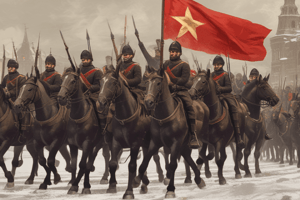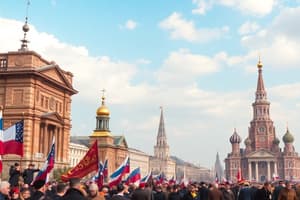Podcast
Questions and Answers
Which group played a key role in governing Russia between February and October 1917?
Which group played a key role in governing Russia between February and October 1917?
- The soviets (correct)
- The All-Russian Congress of Soviets
- The Council of People's Commissars
- The Bolsheviks
What was the role of the Council of People's Commissars (Sovnarkom) in governing Russia?
What was the role of the Council of People's Commissars (Sovnarkom) in governing Russia?
- To elect the All-Russian Congress of Soviets
- To discuss Russia's future
- To represent the local soviets
- To govern Russia on a day-to-day basis (correct)
Who was elected as the Chairman of Sovnarkom?
Who was elected as the Chairman of Sovnarkom?
- Lenin (correct)
- Stalin
- The All-Russian Congress of Soviets
- Trotsky
Which Commissar was head of the People's Commissariat of Foreign Affairs?
Which Commissar was head of the People's Commissariat of Foreign Affairs?
Before 1917, Trotsky was already a revolutionary hero due to his role in which failed revolution?
Before 1917, Trotsky was already a revolutionary hero due to his role in which failed revolution?
Who led the Communist's Red Army to victory in the Civil War?
Who led the Communist's Red Army to victory in the Civil War?
Why was Trotsky expelled from the Party and from Russia?
Why was Trotsky expelled from the Party and from Russia?
What were the two main ways in which Lenin established control over Russia?
What were the two main ways in which Lenin established control over Russia?
Why did Sovnarkom initially have little real power?
Why did Sovnarkom initially have little real power?
How did Lenin argue that the new government in Russia was democratic?
How did Lenin argue that the new government in Russia was democratic?
Which political parties were represented in the Congress of Soviets in 1918?
Which political parties were represented in the Congress of Soviets in 1918?
Which political party did Joseph Stalin belong to prior to the October Revolution?
Which political party did Joseph Stalin belong to prior to the October Revolution?
What role did Joseph Stalin play in the October Revolution and the Civil War?
What role did Joseph Stalin play in the October Revolution and the Civil War?
Why did moderates within the Bolshevik Party resign in protest?
Why did moderates within the Bolshevik Party resign in protest?
What did the Petrograd Trades Union Council and the First Conference of Female Factory Workers do in support of the new Bolshevik Government?
What did the Petrograd Trades Union Council and the First Conference of Female Factory Workers do in support of the new Bolshevik Government?
Why did Lenin close the Constituent Assembly after only one day?
Why did Lenin close the Constituent Assembly after only one day?
Why did Lenin refuse to recognize the results of the soviet elections in April and May 1918?
Why did Lenin refuse to recognize the results of the soviet elections in April and May 1918?
What did Nikolai Bukharin argue in regards to 'formal democracy' during the Civil War?
What did Nikolai Bukharin argue in regards to 'formal democracy' during the Civil War?
What did Lenin's early decrees authorize?
What did Lenin's early decrees authorize?
Flashcards are hidden until you start studying
Study Notes
Key Groups and Leadership in Early 1917 Russia
- The Provisional Government was crucial in governing Russia between February and October 1917, stepping in after the abdication of Tsar Nicholas II.
- The Council of People's Commissars (Sovnarkom) emerged post-October Revolution and served as the government of the Bolshevik regime, focused on implementing socialist policies.
Leadership in Sovnarkom
- Vladimir Lenin was elected as the Chairman of Sovnarkom, leading the government in managing Russia's transition to a socialist state.
- Leon Trotsky held the position of People's Commissar for Foreign Affairs, dealing with Russia's international relations after the revolution.
Trotsky’s Revolutionary Background
- Before 1917, Trotsky gained prominence as a revolutionary hero for his involvement in the 1905 Russian Revolution, which ultimately failed but highlighted his leadership skills.
Civil War Contributions
- Trotsky commanded the Red Army during the Civil War, playing an integral role in securing Bolshevik victory against opposing forces.
Party Expulsion
- Trotsky was expelled from the Communist Party and subsequently exiled from Russia due to his opposition to Stalin's increasing authoritarianism and the bureaucratic direction of the party.
Establishing Control
- Lenin established control through two main strategies: consolidating power via the Soviets and implementing radical economic policies, including the nationalization of land and industry.
- Initially, Sovnarkom had limited authority as it lacked widespread support and faced significant challenges from other political entities, like the Provisional Government and various opposition groups.
Democratic Arguments and Political Representation
- Lenin framed the new government as democratic, arguing that it represented the interests of the workers and peasants.
- The Congress of Soviets in 1918 included multiple political parties, showcasing a breadth of socialist and revolutionary ideologies, though dominated by the Bolsheviks.
Stalin’s Political Role
- Before the October Revolution, Joseph Stalin was a member of the Bolshevik Party, actively engaging in its strategies and leadership dynamics.
- During the October Revolution and the Civil War, Stalin held vital roles, including organizing the Bolshevik forces and maintaining party loyalty.
Internal Conflicts and Support
- Moderates within the Bolshevik Party resigned in protest against Lenin's authoritarian tactics and the party's departure from broader socialist principles.
- The Petrograd Trades Union Council and the First Conference of Female Factory Workers expressed support for the Bolshevik government, coordinating actions to bolster its legitimacy and operational capacity.
Closure of the Constituent Assembly
- Lenin shut down the Constituent Assembly after one day, arguing that it contradicted the will of the proletariat and undermined the Soviets' authority, which he claimed represented true democracy.
Election Rejection and Democratic Views
- Lenin refused to recognize the results of the soviet elections held in April and May 1918, considering the outcomes as a threat to Bolshevik power and not reflective of the revolutionary objectives.
- Nikolai Bukharin maintained that formal democracy was inadequate during the Civil War, advocating for a focus on pragmatic governance aligned with Bolshevik principles.
Early Decrees by Lenin
- Lenin's early decrees provided a legal framework for land redistribution and the nationalization of industries, marking the transition to a socialist economy and governance structure.
Studying That Suits You
Use AI to generate personalized quizzes and flashcards to suit your learning preferences.




